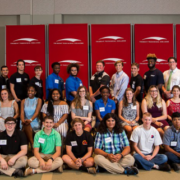National Center Helps Stakeholders Grow Construction Workforce with Resources for Strengthening Participation of Women in Apprenticeship
Working simultaneously with unions, contractors, women, and students, the National Center for Women’s Equity in Apprenticeship and Employment is helping the construction industry grow the skilled workforce it needs by incorporating and retaining more women. One way the center is doing this is by bringing registered apprenticeship to bear as a proven strategy to grow and retain talent, according to Jayne Vellinga, Executive Director of Chicago Women in Trades, the parent organization of the center.
By providing evidence-based strategies and practical applications, the center supports employers in their efforts to build and implement apprenticeship and pre-apprenticeship programs and then provides ongoing support to ensure that more women successfully complete their apprenticeships and launch long-term careers in their trade.
Midwest stakeholders including registered apprenticeship sponsors, training providers, and workforce development professionals can benefit first hand from the center’s expertise by participating in the upcoming Building Women’s Equity in Apprenticeship and Employment: An Institute for Practitioners and Employers, which will be held Friday, October 13, 2017 before the start of the Women Build Nations conference in Chicago.
The multi-pronged approach taken by the center is a reflection of several factors influencing the availability of skilled laborers today.
“If I’m a contractor, I want to find some women that I’m going to cultivate and treat like an integral part of my workforce so when I bid on a project that has a female hiring goal, I already have a great skilled person that I know produces for me,” said Vellinga.
Bringing women into these careers is good for the employers but it’s also an issue of equity, according to Vellinga. In construction jobs, which have been traditionally held by male workers, a new employee with a high school diploma and no work experience will enter the field at nearly $20 per hour. In five years, that person could earn nearly $50 per hour. By contrast, roles with similar educational requirements in traditionally female jobs, such as Nurse’s Assistant, will enter the workforce at around $12 per hour and only increase their earning potential by a few dollars in five years.
A couple of years ago, the center received a Women in Apprenticeship and Nontraditional Occupations grant from the U.S. Department of Labor to set up a technical assistance center for the Midwest. The center was one of three grantees spanning the county. With this grant, the center has begun to expand their reach and bring technical assistance across the region.
The center works with their national partners, primarily unions, to develop technical assistance plans, provide training, help decipher regulations, and develop best practices and case studies. They provide employers assistance on issues as varied as recruitment and retention to domestic violence.
“It’s also about career choice,” explains Vellinga. “Not every woman is a nurturer. Not every woman without a college degree wants to work with children or old people or be a waitress. Women have wide range of interests whether they’ve had an opportunity to go to college or not. It’s important to have that level of career choice and the earning power that goes with jobs that have been traditionally male.”
In 2016, the center received an additional grant from the Department of Labor targeting equity partners. The center was named the lead agency for a consortium of 10 organizations around the country. This consortium includes virtually every funded tradeswoman organization in the country and works with the national Registered Apprenticeship program. The consortium assists apprenticeship program sponsors with their equal employment opportunity planning. They provide tools, guidance, technical assistance, training, and other services in support of building equity for women in apprenticeship. Today, women make up only 15% of all apprenticeships, and in the construction field, the numbers are much worse at just 3% nationwide.
An improving economy and projected workforce shortages are helping to spur momentum for women in trades. Vellinga also points out that certain incentive programs work exceptionally well to motivate positive hiring practices. The Illinois Tollway system, for example, offers earned credit to contractors who bid on construction projects for each woman or minority that is hired. What makes this program especially beneficial is that it also awards credit for retaining these employees. “So, if you’ve done a good job with your workforce, you don’t necessarily have to be the lowest bidder to be successful in getting a contract,” said Vellinga. “What I like about this system is that it rewards you for what you’ve done, not just what you say you’re going to do.”
In her 17 years at Chicago Women in Trades, Vellinga has seen significant improvement in the work environment for women in construction. As an example, she tells about one of the plumber’s unions she works with in the Chicago area. Just four years ago, this group had just two women in their apprenticeship program. However, with a change in mindset among the union’s leadership, they started bringing more women into the program. Today, they have 32 women in their apprenticeship program and are also supporting a robust mentorship program.
“Last year, for the first time in this local’s history, they sent women as delegates to the union association convention. And not just one woman, but three,” said Vellinga. “These numbers are going to make the difference. You can’t ignore, refuse to train or create an untenable work environment for an important percentage of your workforce.”
For more information on the center or on the Women Build Nations conference, contact Jayne Vellinga by email at jvellinga@cwit2.org.


Leave a Reply
Want to join the discussion?Feel free to contribute!